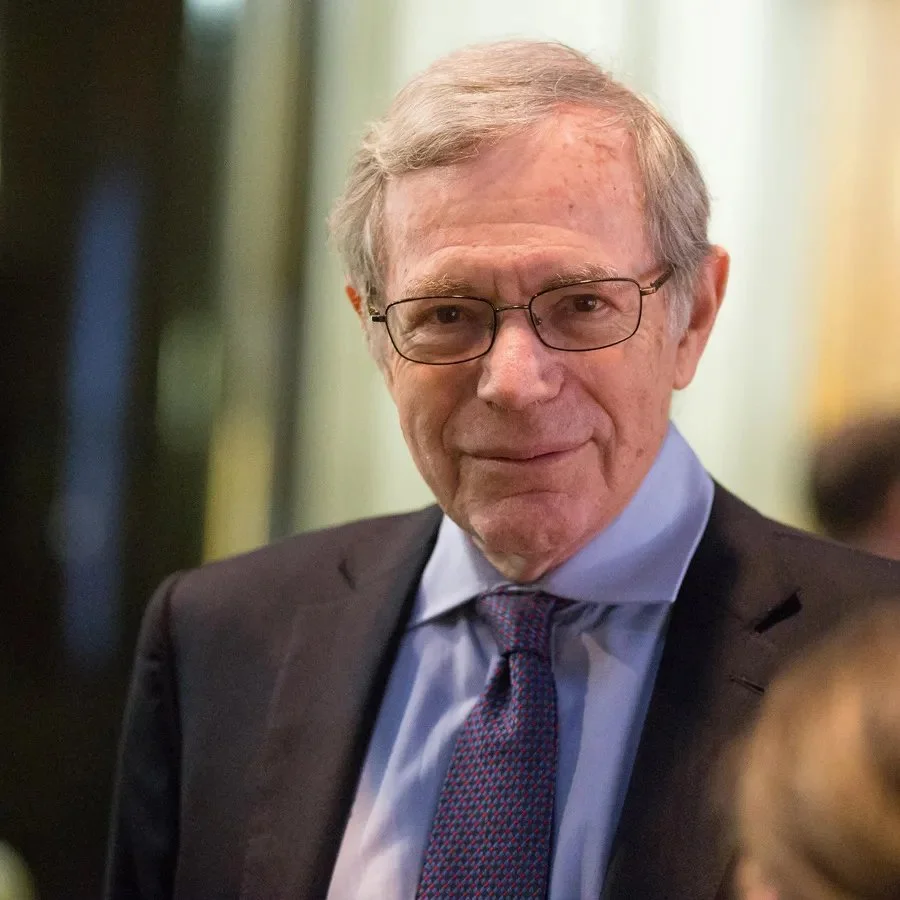
Events (all Pacific Times)

Banned Books Club - Fall 2025 Series (Part 4)
This will be the third 4-book series facilitated by the Educators for Democracy team at The Institute for Common Power. The Educators for Democracy are current frontline teachers who are experienced in instructional design and who are committed to the work of teaching truth. For the Fall 2025 series we are intentionally highlighting graphic novel and younger reader texts. This series will feature discussion of:
September 8th - Kindred by Octavia Butler (read either the graphic novel or original novel)
October 13th - How the García Girls Lost Their Accents by Julia Alvarez (young adult)
November 10th - March by John Lewis (read all three books or just book one)
December 8th - Gender Queer by Maia Kobabe (graphic novel)
All meetings are on the following Tuesdays (aside from the 8th) from 4:30-6:00 PST / 7:30-9:00 EST
Banned Books Club is a free event (donations always appreciated!) facilitated by the Educators for Democracy team at The Institute for Common Power.

Banned Books Club - Fall 2025 Series (Part 3)
This will be the third 4-book series facilitated by the Educators for Democracy team at The Institute for Common Power. The Educators for Democracy are current frontline teachers who are experienced in instructional design and who are committed to the work of teaching truth. For the Fall 2025 series we are intentionally highlighting graphic novel and younger reader texts. This series will feature discussion of:
September 8th - Kindred by Octavia Butler (read either the graphic novel or original novel)
October 14th - How the García Girls Lost Their Accents by Julia Alvarez (young adult)
November 10th - March by John Lewis (read all three books or just book one)
December 8th - Gender Queer by Maia Kobabe (graphic novel)
All meetings are on the following Tuesdays (aside from the 8th) from 4:30-6:00 PST / 7:30-9:00 EST
Banned Books Club is a free event (donations always appreciated!) facilitated by the Educators for Democracy team at The Institute for Common Power.

Banned Books Club - Fall 2025 Series (Part 2)
This will be the third 4-book series facilitated by the Educators for Democracy team at The Institute for Common Power. The Educators for Democracy are current frontline teachers who are experienced in instructional design and who are committed to the work of teaching truth. For the Fall 2025 series we are intentionally highlighting graphic novel and younger reader texts. This series will feature discussion of:
September 8th - Kindred by Octavia Butler (read either the graphic novel or original novel)
October 13th - How the García Girls Lost Their Accents by Julia Alvarez (young adult)
November 11th - March by John Lewis (read all three books or just book one)
December 9th - Gender Queer by Maia Kobabe (graphic novel)
All meetings are on the following Tuesdays (aside from the 8th) from 4:30-6:00 PST / 7:30-9:00 EST
Banned Books Club is a free event (donations always appreciated!) facilitated by the Educators for Democracy team at The Institute for Common Power.
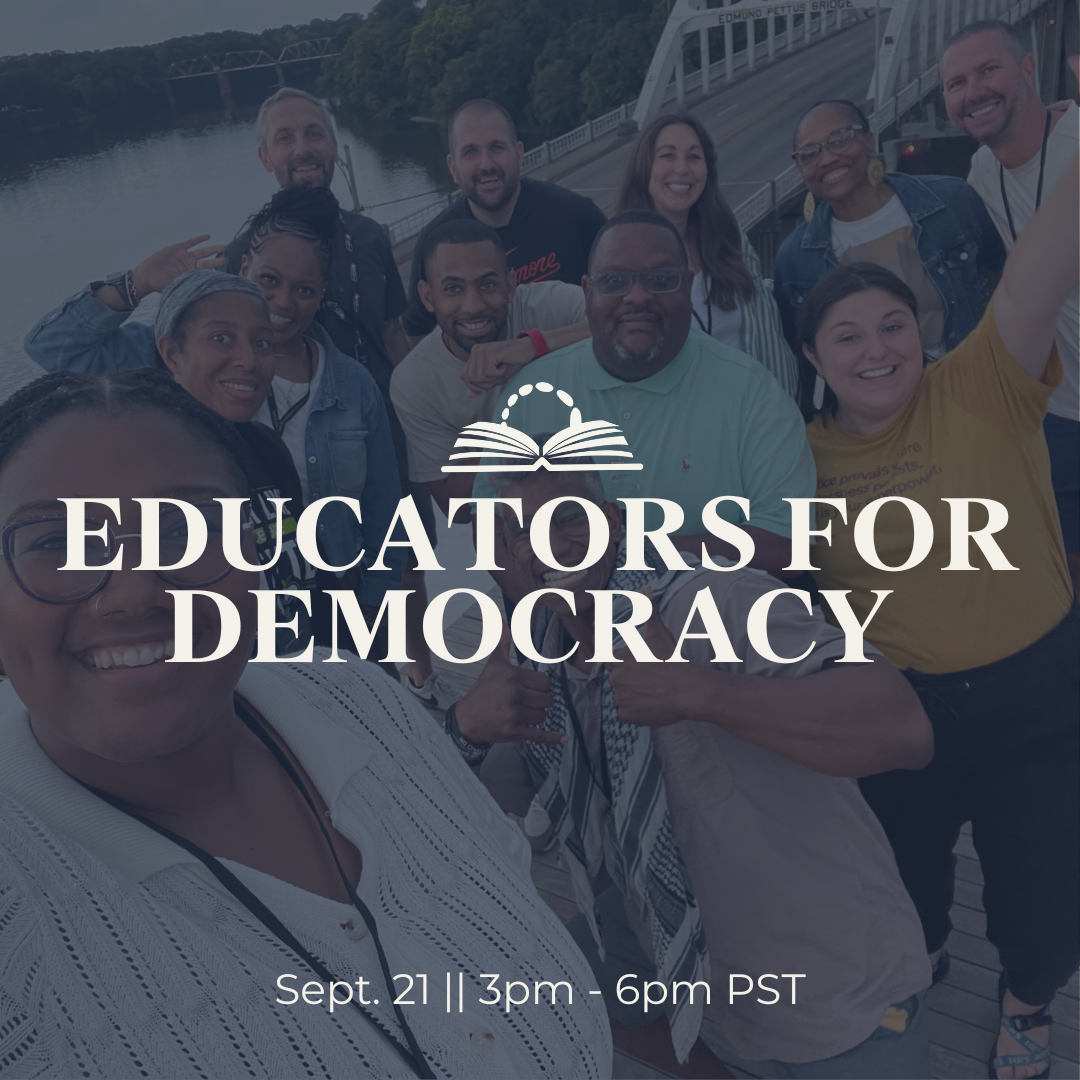
Institute for Common Power Educators for Democracy Teach-In
We are confronted today in America by an attack on truth in education. It is an attempt by politically motivated individuals, government offices, and politicians to halt the full teaching of American life by eradicating fully truthful aspects of our past, present, and potential futures. At their core, such attacks seek to erase the triumphs of African Americans, women, LGBTQ+ Americans, and others who have been vital in the struggle for civil rights and voting justice. To this end, we have created the Educators for Democracy speaker series to teach truth and encourage action that brings to fruition an inclusive democracy.
In this VIRTUAL teach-in, we will feature five educators from across the country each quarter who will deliver thirty minute talks on some aspect of American democracy.The lectures will have a heavy focus on history and will work to connect the past to the present as they encourage people to engage in work that focuses on social and voting justice.
Presenters for September 2025
Samuel Agyare - Minneapolis, Minnesota
Fay Barber-Dansby - Anderson, Indiana
Kendra Egly - Spokane, Washington
Pia Payne-Shannon - Minneapolis, Minnesota
Steven Ragsdale - Columbia, Maryland

Banned Books Club - Fall 2025 Series
This will be the third 4-book series facilitated by the Educators for Democracy team at The Institute for Common Power. The Educators for Democracy are current frontline teachers who are experienced in instructional design and who are committed to the work of teaching truth. For the Fall 2025 series we are intentionally highlighting graphic novel and younger reader texts. This series will feature discussion of:
September 8th - Kindred by Octavia Butler (read either the graphic novel or original novel)
October 14th - How the García Girls Lost Their Accents by Julia Alvarez (young adult)
November 11th - March by John Lewis (read all three books or just book one)
December 9th - Gender Queer by Maia Kobabe (graphic novel)
All meetings are on the following Tuesdays (aside from the 8th) from 4:30-6:00 PST / 7:30-9:00 EST
Banned Books Club is a free event (donations always appreciated!) facilitated by the Educators for Democracy team at The Institute for Common Power.
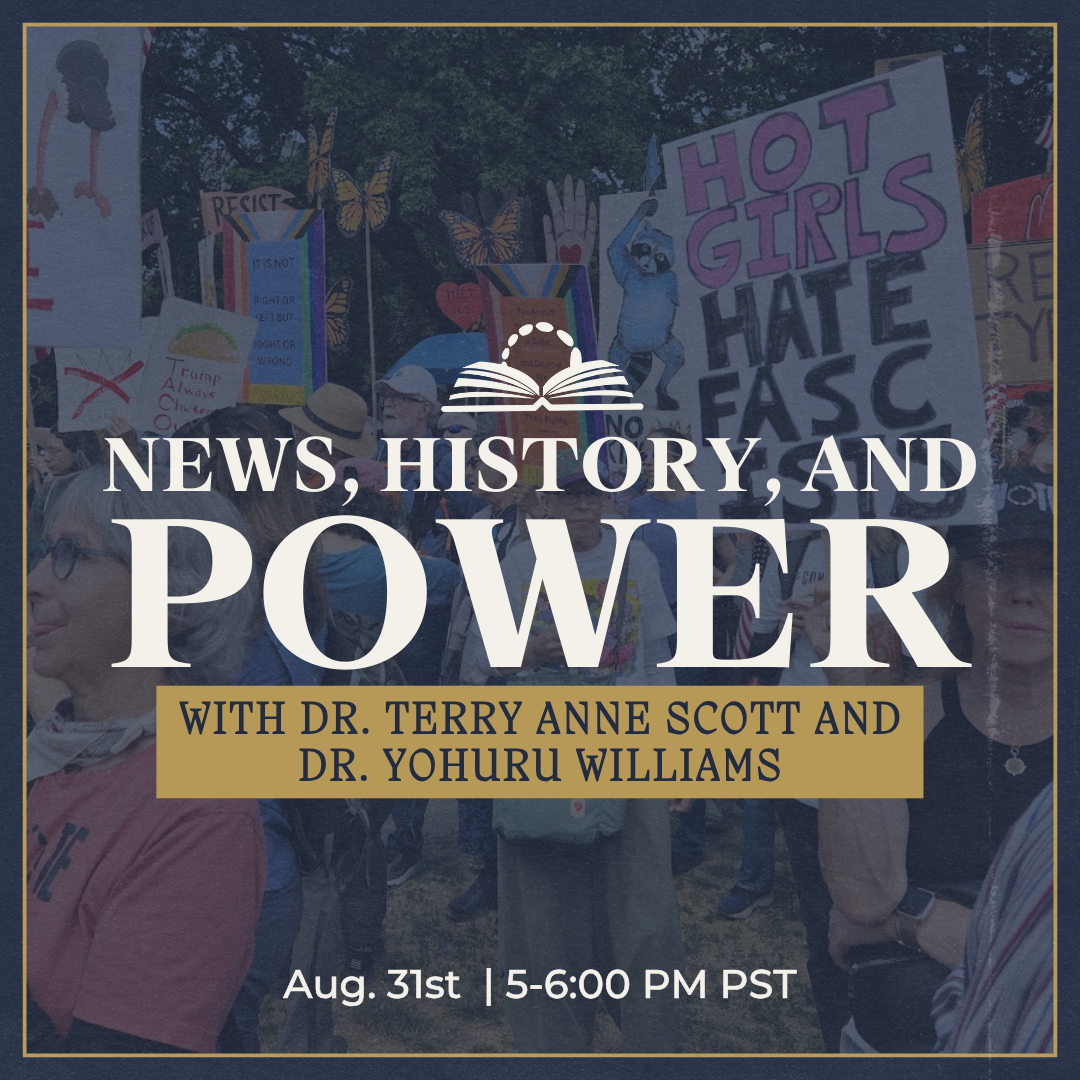
News, History, and Power with Dr. Terry Anne Scott and Dr. Yohuru Williams
Join the Institute for Common Power’s Dr. Terry Anne Scott and Dr. Yohuru Williams in an online event to discuss when history meets the heat of now.
Sign up using the button below.

"From Selma to Stonewall" - Lecture 3
This series surveys the tensions and solidarity points between the struggles for African American Civil Rights and LGBTQ+ Rights.
Speaker: Dr. Meredith Bagley
Course Dates: June 9, 16, 23 at 4 PM PST.
Lectures will examine queer-identified figures within the Civil Rights movement - after laying a working foundation for LGBTQ+ terminology - before moving forward to the ways the two movements overlap, inform, and occasionally exist in tension. Through a largely, but not exclusively, chronological approach, this three-part series will examine Black Lesbian Feminism, the Stonewall Riots, Marriage Equality, and the current crisis over gender-affirming health care.

"From Selma to Stonewall" - Lecture 2
This series surveys the tensions and solidarity points between the struggles for African American Civil Rights and LGBTQ+ Rights.
Speaker: Dr. Meredith Bagley
Course Dates: June 9, 16, 23 at 4 PM PST.
Lectures will examine queer-identified figures within the Civil Rights movement - after laying a working foundation for LGBTQ+ terminology - before moving forward to the ways the two movements overlap, inform, and occasionally exist in tension. Through a largely, but not exclusively, chronological approach, this three-part series will examine Black Lesbian Feminism, the Stonewall Riots, Marriage Equality, and the current crisis over gender-affirming health care.

"From Selma to Stonewall" - Lecture 1
This series surveys the tensions and solidarity points between the struggles for African American Civil Rights and LGBTQ+ Rights.
Speaker: Dr. Meredith Bagley
Course Dates: June 9, 16, 23 at 4 PM PST.
Lectures will examine queer-identified figures within the Civil Rights movement - after laying a working foundation for LGBTQ+ terminology - before moving forward to the ways the two movements overlap, inform, and occasionally exist in tension. Through a largely, but not exclusively, chronological approach, this three-part series will examine Black Lesbian Feminism, the Stonewall Riots, Marriage Equality, and the current crisis over gender-affirming health care.

Banned Books Club - All Boys Aren’t Blue by George M. Johnson
The Banned Books Club will meet monthly from March - June to discuss banned or challenged literature—from modern works like "Stamped" to classics such as "The Bluest Eye."
June 2nd - All Boys Aren’t Blue by George M. Johnson
The Institute for Common Power, the educational branch of Common Power, is inviting you to join our Banned Books Club. According to a PEN America report, the 2023-2024 school year recorded the highest instances of book bans and highest number of unique titles banned on record – over 4,000 unique titles were removed in over 10,000 instances of book bans. The Institute believes in the enduring power of books to provoke thought, challenge norms, and broaden perspectives. During our meetings of the Banned Books Club we will discuss race, identity, and freedom of expression as the club dives into the societal issues these books illuminate.
In a world increasingly wary of uncomfortable truths, we believe in the right to read freely and believe that banning books is anathema to democracy. As with our overall organizational mission of safeguarding the vote, we also hold true that safeguarding the diversity of ideas is essential to a just and inclusive democracy.
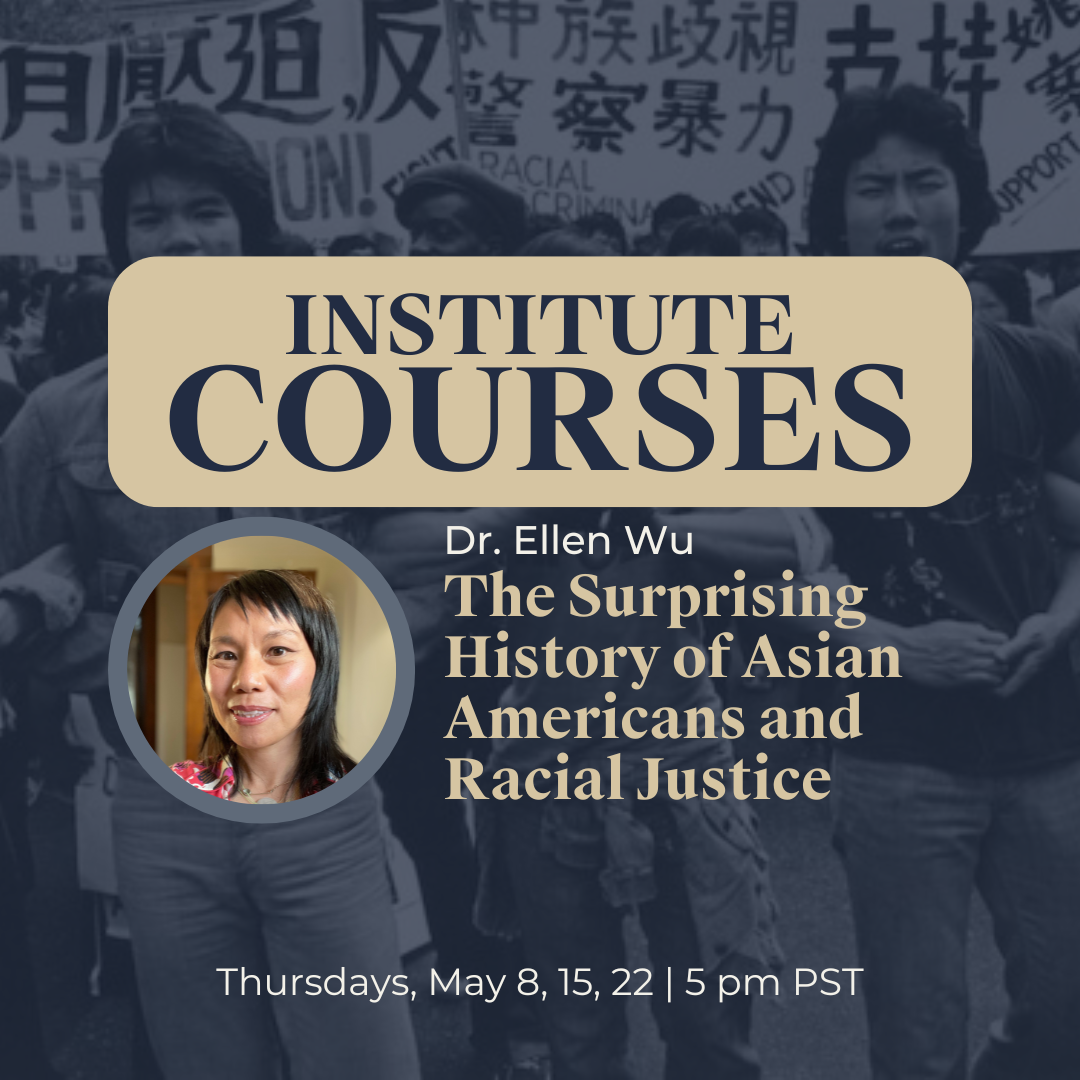
Institute Course - The Surprising History of Asian Americans and Racial Justice - Lecture 3
Lecture Two: "Democracy" - An overview of the little-known, but increasingly consequential, impact of Asian American political engagement
Speaker: Dr. Ellen Wu
Course Dates: May 8, 15, 22 at 5 pm PST.
Professor Ellen Wu researches, teaches, and writes about race, immigration, and United States history. She is a proud graduate of Indiana University Bloomington’s College of Arts and Sciences, where she doubled majored in Biology and History. Prof. Wu earned an MA in Asian American Studies at UCLA and a PhD in History at the University of Chicago. She is now an Associate Professor of History and Associate Director of the College Arts and Humanities Institute at IU Bloomington.
She is the author of the award-winning book The Color of Success: Asian Americans and the Origins of the Model Minority (2014), and is currently writing Overrepresented: The Surprising History of Asian Americans and Racial Justice, a new story about diversity, data, and democracy in the United States.
Lectures for this course will be recorded for everyone to watch on your own timing. Registrants will receive viewing instructions/reminders in advance of each lecture.

Institute Course - The Surprising History of Asian Americans and Racial Justice - Lecture 2
Lecture Two: "Data" - deep-dive into the strange status of Asian Americans as an "overrepresented" rather than "underrepresented" minority group.
Speaker: Dr. Ellen Wu
Course Dates: May 8, 15, 22 at 5 pm PST.
Professor Ellen Wu researches, teaches, and writes about race, immigration, and United States history. She is a proud graduate of Indiana University Bloomington’s College of Arts and Sciences, where she doubled majored in Biology and History. Prof. Wu earned an MA in Asian American Studies at UCLA and a PhD in History at the University of Chicago. She is now an Associate Professor of History and Associate Director of the College Arts and Humanities Institute at IU Bloomington.
She is the author of the award-winning book The Color of Success: Asian Americans and the Origins of the Model Minority (2014), and is currently writing Overrepresented: The Surprising History of Asian Americans and Racial Justice, a new story about diversity, data, and democracy in the United States.
Lectures for this course will be recorded for everyone to watch on your own timing. Registrants will receive viewing instructions/reminders in advance of each lecture.

Institute Course - The Surprising History of Asian Americans and Racial Justice - Lecture 1
Lecture One: "Diversity" - Explores how the "minority rights" revolution of the 20th century, sparked by the Black Freedom Movement, widened to encompass Asian Americans.
Speaker: Dr. Ellen Wu
Course Dates: May 8, 15, 22 at 5 pm PST.
Professor Ellen Wu researches, teaches, and writes about race, immigration, and United States history. She is a proud graduate of Indiana University Bloomington’s College of Arts and Sciences, where she doubled majored in Biology and History. Prof. Wu earned an MA in Asian American Studies at UCLA and a PhD in History at the University of Chicago. She is now an Associate Professor of History and Associate Director of the College Arts and Humanities Institute at IU Bloomington.
She is the author of the award-winning book The Color of Success: Asian Americans and the Origins of the Model Minority (2014), and is currently writing Overrepresented: The Surprising History of Asian Americans and Racial Justice, a new story about diversity, data, and democracy in the United States.
Lectures for this course will be recorded for everyone to watch on your own timing. Registrants will receive viewing instructions/reminders in advance of each lecture.

Banned Books Club - The Bluest Eye by Toni Morrison
The Banned Books Club will meet monthly from March - June to discuss banned or challenged literature—from modern works like "Stamped" to classics such as "The Bluest Eye."
May 5th - The Bluest Eye by Toni Morrison
The Institute for Common Power, the educational branch of Common Power, is inviting you to join our Banned Books Club. According to a PEN America report, the 2023-2024 school year recorded the highest instances of book bans and highest number of unique titles banned on record – over 4,000 unique titles were removed in over 10,000 instances of book bans. The Institute believes in the enduring power of books to provoke thought, challenge norms, and broaden perspectives. During our meetings of the Banned Books Club we will discuss race, identity, and freedom of expression as the club dives into the societal issues these books illuminate.
In a world increasingly wary of uncomfortable truths, we believe in the right to read freely and believe that banning books is anathema to democracy. As with our overall organizational mission of safeguarding the vote, we also hold true that safeguarding the diversity of ideas is essential to a just and inclusive democracy.
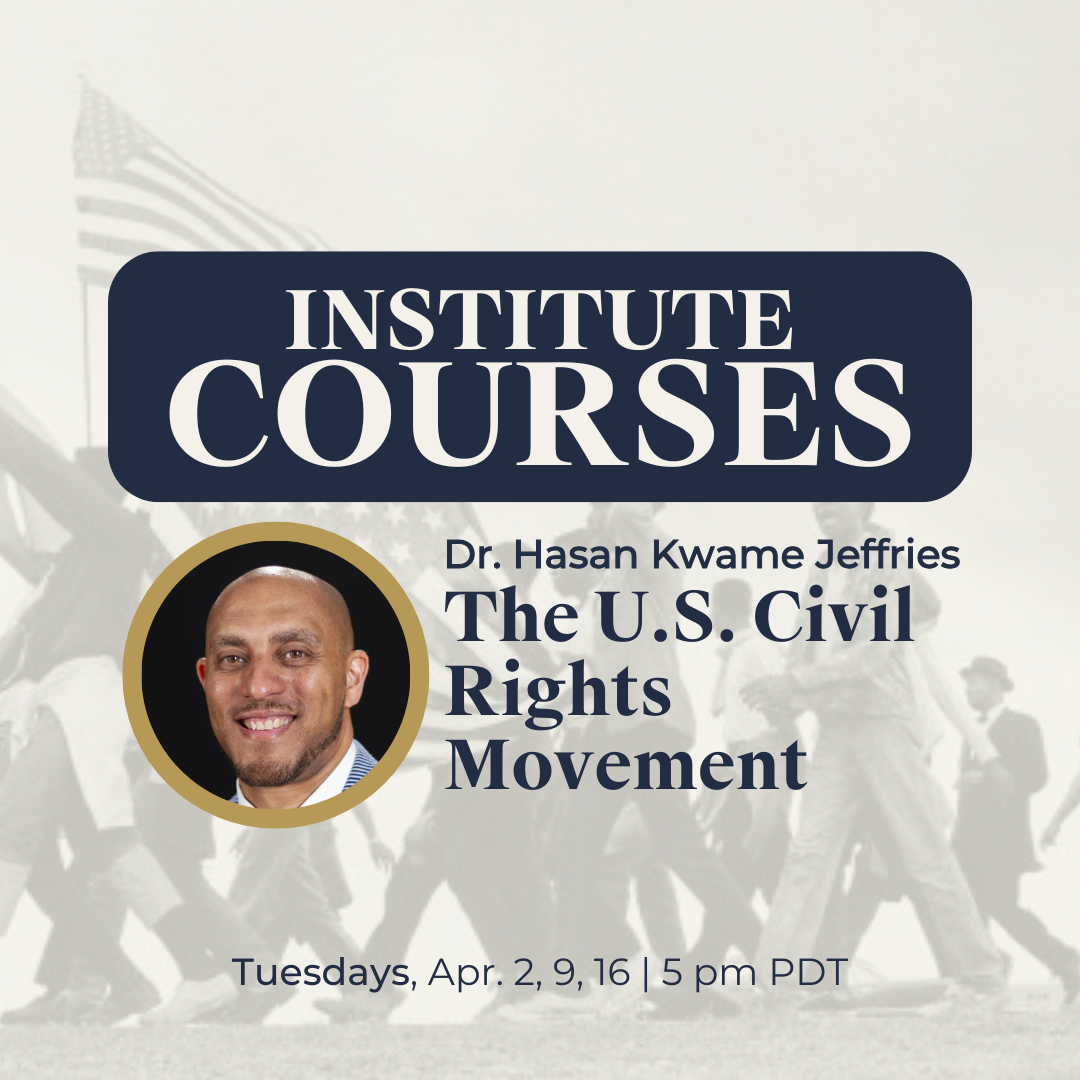
Institute Course - The U.S. Civil Rights Movement - Lecture 3
Lecture Three: “What do we want?!” From Civil Rights Protests to Black Power Politics, April 16
The Civil Rights Movement of the 1950s and 1960s transformed America. It ended legalized racial segregation, extended the franchise to Black southerners, and created unprecedented job, business, and housing opportunities for Black northerners. But it also left a great deal undone. This course explains the origin, evolution, and outcomes of the Civil Rights Movement. In approach, it looks at the movement from the bottom-up and the inside-out, aiming to make clear how everyday Black people made America a fairer and more just - if still imperfect - society.
Speaker: Dr. Hasan Kwame Jeffries
Course Dates: April. 1, 8, 15 at 5pm PST.
Lectures for this course will be recorded for everyone to watch on your own timing. Registrants will receive viewing instructions/reminders in advance of each lecture.

Institute Course - The U.S. Civil Rights Movement - Lecture 2
Lecture Two: The Arc of Justice: Dr. Martin Luther King, Jr. and Mass Mobilizing April 9
The Civil Rights Movement of the 1950s and 1960s transformed America. It ended legalized racial segregation, extended the franchise to Black southerners, and created unprecedented job, business, and housing opportunities for Black northerners. But it also left a great deal undone. This course explains the origin, evolution, and outcomes of the Civil Rights Movement. In approach, it looks at the movement from the bottom-up and the inside-out, aiming to make clear how everyday Black people made America a fairer and more just - if still imperfect - society.
Speaker: Dr. Hasan Kwame Jeffries
Course Dates: April. 1, 8, 15 at 5pm PST.
Lectures for this course will be recorded for everyone to watch on your own timing. Registrants will receive viewing instructions/reminders in advance of each lecture.

Banned Books Club - An Indigenous Peoples’ History of the United States by Roxanne Dunbar-Ortiz
The Banned Books Club will meet monthly from March - June to discuss banned or challenged literature—from modern works like "Stamped" to classics such as "The Bluest Eye."
April 7th - An Indigenous Peoples’ History of the United States by Roxanne Dunbar-Ortiz
The Institute for Common Power, the educational branch of Common Power, is inviting you to join our Banned Books Club. According to a PEN America report, the 2023-2024 school year recorded the highest instances of book bans and highest number of unique titles banned on record – over 4,000 unique titles were removed in over 10,000 instances of book bans. The Institute believes in the enduring power of books to provoke thought, challenge norms, and broaden perspectives. During our meetings of the Banned Books Club we will discuss race, identity, and freedom of expression as the club dives into the societal issues these books illuminate.
In a world increasingly wary of uncomfortable truths, we believe in the right to read freely and believe that banning books is anathema to democracy. As with our overall organizational mission of safeguarding the vote, we also hold true that safeguarding the diversity of ideas is essential to a just and inclusive democracy.

Institute Course - The U.S. Civil Rights Movement - Lecture 1
Lecture One: Groundwork: The Origins of the Civil Rights Movement. April 2
The Civil Rights Movement of the 1950s and 1960s transformed America. It ended legalized racial segregation, extended the franchise to Black southerners, and created unprecedented job, business, and housing opportunities for Black northerners. But it also left a great deal undone. This course explains the origin, evolution, and outcomes of the Civil Rights Movement. In approach, it looks at the movement from the bottom-up and the inside-out, aiming to make clear how everyday Black people made America a fairer and more just - if still imperfect - society.
Speaker: Dr. Hasan Kwame Jeffries
Course Dates: April. 1, 8, 15 at 5pm PST.
Lectures for this course will be recorded for everyone to watch on your own timing. Registrants will receive viewing instructions/reminders in advance of each lecture.
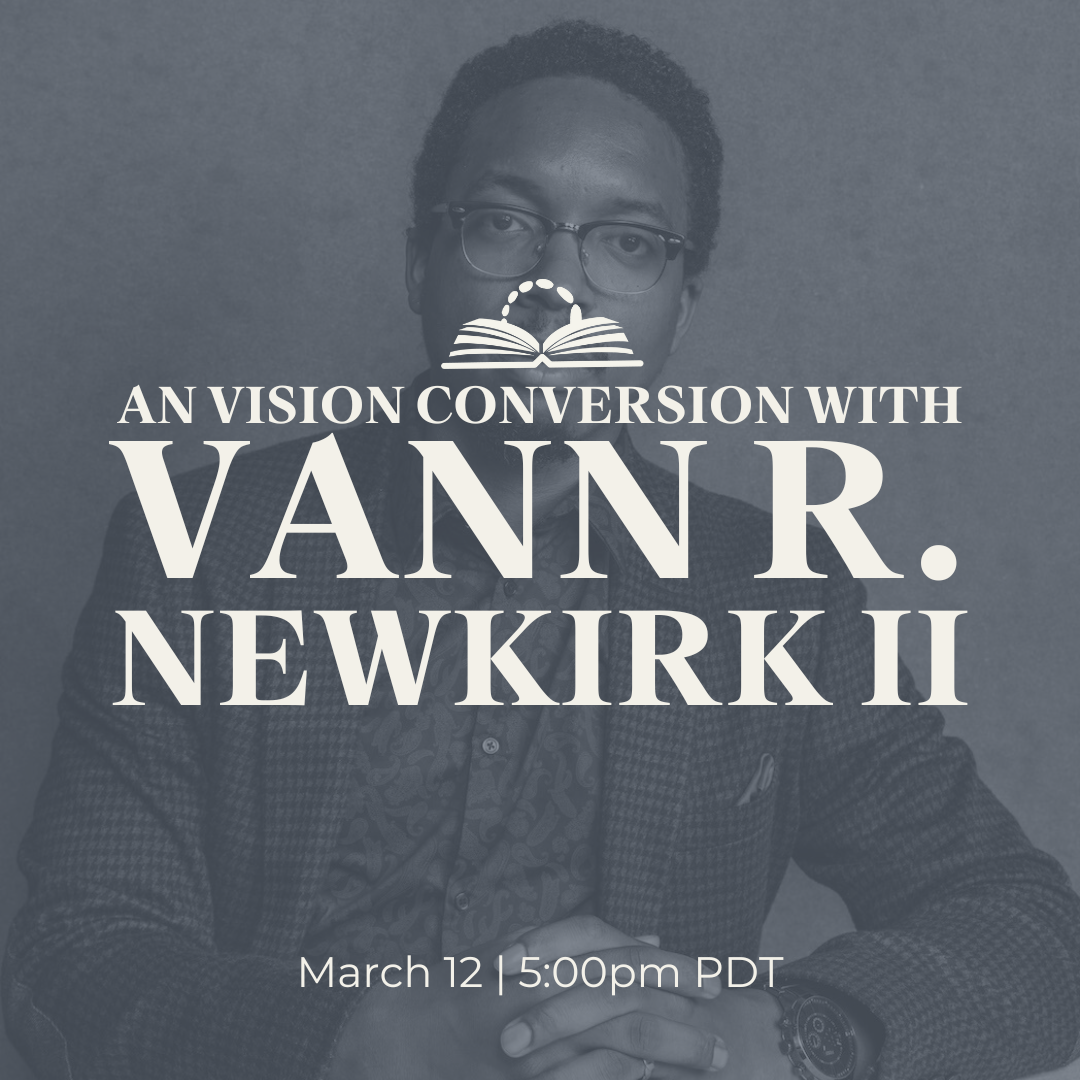
An Institute for Common Power Vision Conversation with Vann R. Newkirk, II
In conversation with Dr. Terry Anne Scott and Dr. David Domke from the Institute for Common Power, Mr. Newkirk will discuss his latest book project, Children of the Flood (Random House), a chronicle of Black communities fighting for survival in the climate crisis.
About Speaker:
Vann R. Newkirk II is a senior editor at the Atlantic and the host and co-creator of narrative podcasts including Floodlines, which received a Peabody award. Newkirk is an Andrew Carnegie Fellow and was a 2020 James Beard award finalist. He was also an Institute for Common Power Selma Scholar-in-Residence.

Banned Books Club - Stamped by Jason Reynolds and Ibram X. Kendi
The Banned Books Club will meet monthly from March - June to discuss banned or challenged literature—from modern works like "Stamped" to classics such as "The Bluest Eye."
March 3rd - Stamped by Jason Reynolds and Ibram X. Kendi
The Institute for Common Power, the educational branch of Common Power, is inviting you to join our Banned Books Club. According to a PEN America report, the 2023-2024 school year recorded the highest instances of book bans and highest number of unique titles banned on record – over 4,000 unique titles were removed in over 10,000 instances of book bans. The Institute believes in the enduring power of books to provoke thought, challenge norms, and broaden perspectives. During our meetings of the Banned Books Club we will discuss race, identity, and freedom of expression as the club dives into the societal issues these books illuminate.
In a world increasingly wary of uncomfortable truths, we believe in the right to read freely and believe that banning books is anathema to democracy. As with our overall organizational mission of safeguarding the vote, we also hold true that safeguarding the diversity of ideas is essential to a just and inclusive democracy.
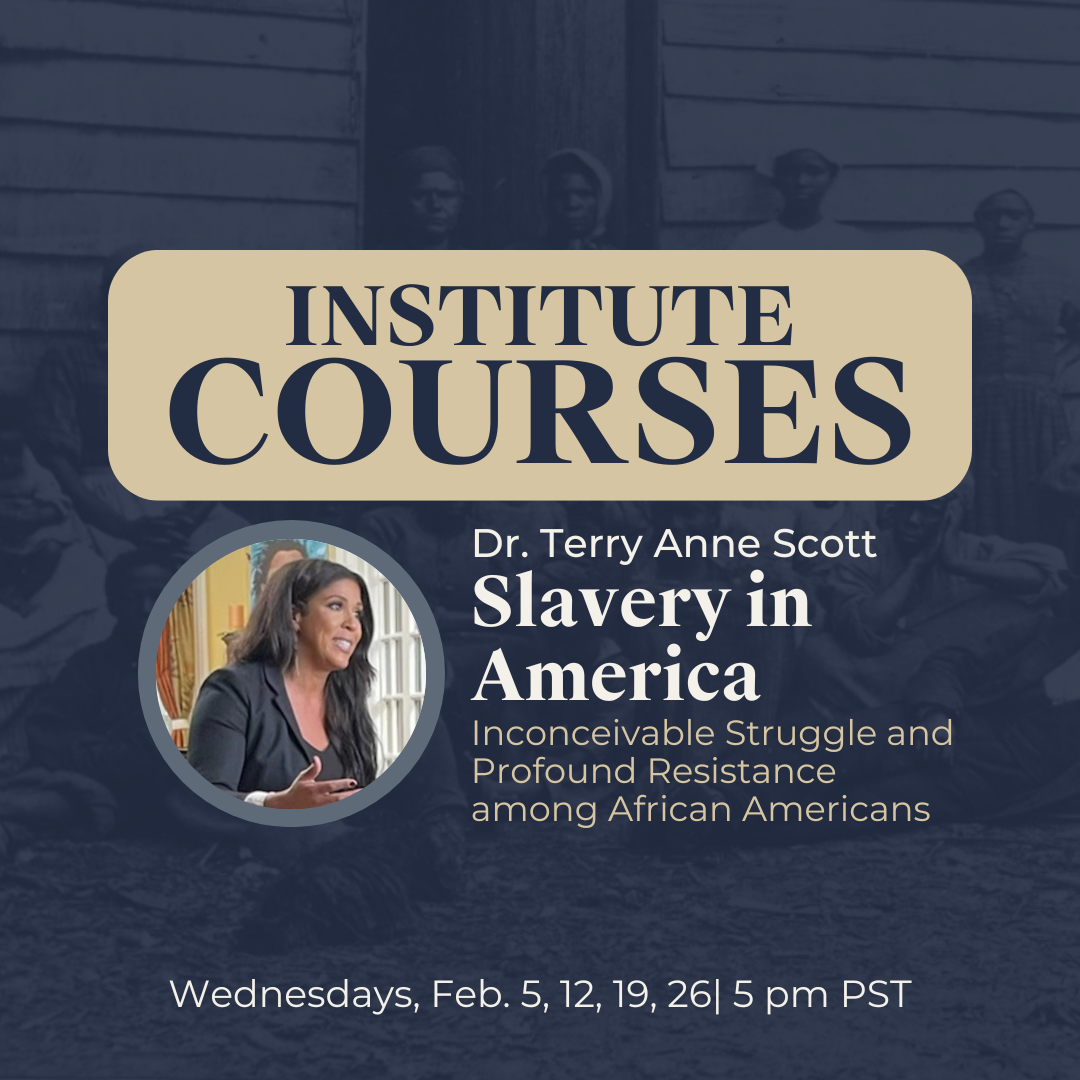
Institute Course - Slavery in America: Inconceivable Struggle and Profound Resistance among African Americans - Lecture 4
In this Institute course, Dr. Terry Anne Scott will survey the struggles and accomplishments of people of African descent in the United States during the institution of slavery. While some attention will be paid to African origins, the three sessions in this series will analyze the historical path from importation through the Civil War and the process of freedom. Through a largely, but not exclusively, chronological approach, Dr. Scott will emphasize how African Americans have worked to determine the trajectory of their own lives and worked to resist and persevere. Areas of exploration will include but are not limited to, the following: the construction of racial identity and alterity, the slave family and community, the domestic slave trade, resistance, and the process of freedom.
Lecture Four: African Americans Taking Their Freedom During the American Civil War. This lecture will examine the process of freedom and how African Americans actively changed the course of the war as they worked to change the course of America and the trajectory of their own lives.
Speaker: Dr. Terry Anne Scott
Course Dates: Feb. 5, 12, 19, 26 at 5pm PST.
Lectures for this course will be recorded for everyone to watch on your own timing. Registrants will receive viewing instructions/reminders in advance of each lecture.

Institute Course - Slavery in America: Inconceivable Struggle and Profound Resistance among African Americans - Lecture 3
In this Institute course, Dr. Terry Anne Scott will survey the struggles and accomplishments of people of African descent in the United States during the institution of slavery. While some attention will be paid to African origins, the three sessions in this series will analyze the historical path from importation through the Civil War and the process of freedom. Through a largely, but not exclusively, chronological approach, Dr. Scott will emphasize how African Americans have worked to determine the trajectory of their own lives and worked to resist and persevere. Areas of exploration will include but are not limited to, the following: the construction of racial identity and alterity, the slave family and community, the domestic slave trade, resistance, and the process of freedom.
Lecture Three: Abolitionism will be the focus of this lecture. How did people work individually and collectively to resist the institution of slavery? What do their efforts teach us about coalition work today?
Speaker: Dr. Terry Anne Scott
Course Dates: Feb. 5, 12, 19, 26 at 5pm PST.
Lectures for this course will be recorded for everyone to watch on your own timing. Registrants will receive viewing instructions/reminders in advance of each lecture.
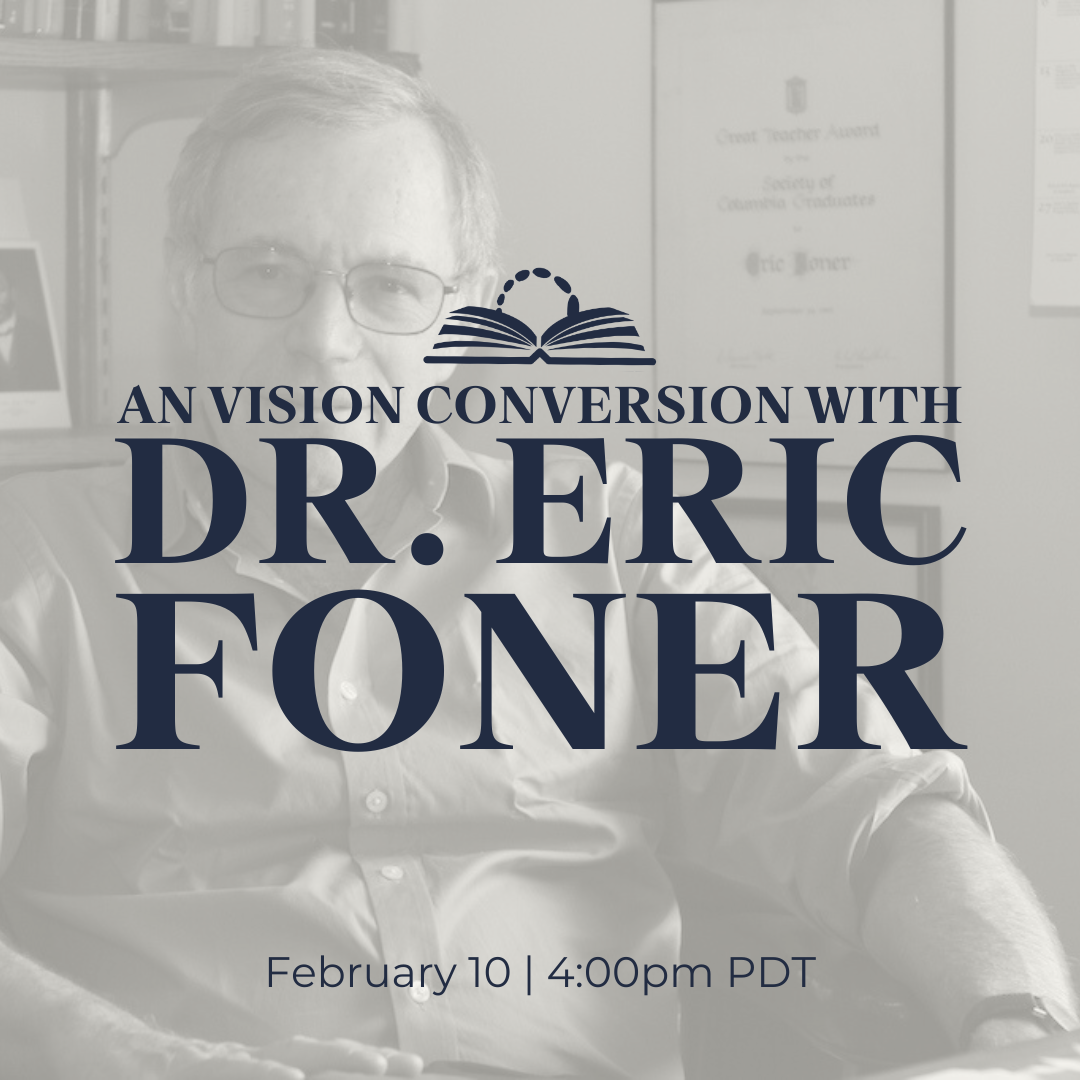
An Institute for Common Power Vision Conversation with Dr. Eric Foner
Renowned historian and Pulitzer Prize winner Dr. Eric Foner, Professor Emeritus at Columbia University and foremost scholar on Reconstruction, will be in conversation with award-winning historian Dr. Terry Anne Scott, Director of the Institute for Common Power. Join them as they discuss Dr. Foner's paradigmatic work and how we create a just and inclusive democracy.
Speaker: Dr. Eric Foner
Dr. Foner's website, his "publications have concentrated on the intersections of intellectual, political and social history, and the history of American race relations.
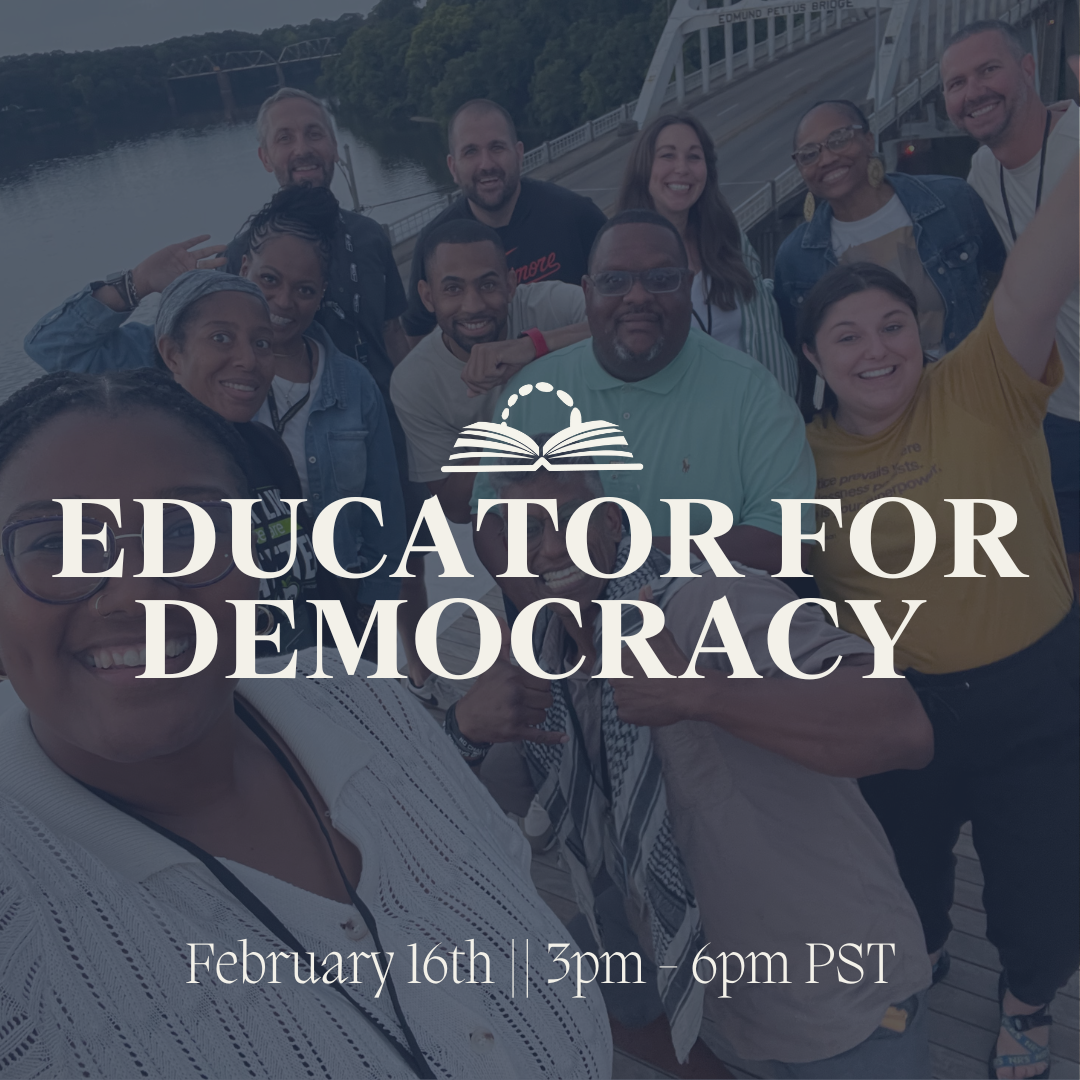
Institute for Common Power Educators for Democracy Teach-In
We are confronted today in America by an attack on truth in education. It is an attempt by politically motivated individuals, government offices, and politicians to halt the full teaching of American life by eradicating fully truthful aspects of our past, present, and potential futures. At their core, such attacks seek to erase the triumphs of African Americans, women, LGBTQ+ Americans, and others who have been vital in the struggle for civil rights and voting justice. The Institute for Common Power cannot and will not idly watch. To this end, we have created the Educators for Democracy speaker series to teach truth and encourage action that brings to fruition an inclusive democracy.
We will feature five educators from across the country each quarter who will deliver thirty minute talks on some aspect of American democracy. Each educator is an Institute for Common Power Educator Ambassador, which means they have traveled with us on a Truth & Purpose Leaning Tour. They are part of our community and understand the power of how education leads to action. The lectures will have a heavy focus on history and will work to connect the past to the present as they encourage people to engage in work that focuses on social and voting justice.

Institute Course - Slavery in America: Inconceivable Struggle and Profound Resistance among African Americans - Lecture 2
In this Institute course, Dr. Terry Anne Scott will survey the struggles and accomplishments of people of African descent in the United States during the institution of slavery. While some attention will be paid to African origins, the three sessions in this series will analyze the historical path from importation through the Civil War and the process of freedom. Through a largely, but not exclusively, chronological approach, Dr. Scott will emphasize how African Americans have worked to determine the trajectory of their own lives and worked to resist and persevere. Areas of exploration will include but are not limited to, the following: the construction of racial identity and alterity, the slave family and community, the domestic slave trade, resistance, and the process of freedom.
Lecture Two: The Domestic Slave Trade and African American Resistance. Take a virtual walking tour through Montgomery, Alabama as we retrace the steps of enslaved people who arrived in one of the largest slave markets in the country. We will also examine Black resistance in varied forms.
Speaker: Dr. Terry Anne Scott
Course Dates: Feb. 5, 12, 19, 26 at 5pm PST.
Lectures for this course will be recorded for everyone to watch on your own timing. Registrants will receive viewing instructions/reminders in advance of each lecture.

Institute Course - Slavery in America: Inconceivable Struggle and Profound Resistance among African Americans - Lecture 1
In this Institute course, Dr. Terry Anne Scott will survey the struggles and accomplishments of people of African descent in the United States during the institution of slavery. While some attention will be paid to African origins, the three sessions in this series will analyze the historical path from importation through the Civil War and the process of freedom. Through a largely, but not exclusively, chronological approach, Dr. Scott will emphasize how African Americans have worked to determine the trajectory of their own lives and worked to resist and persevere. Areas of exploration will include but are not limited to, the following: the construction of racial identity and alterity, the slave family and community, the domestic slave trade, resistance, and the process of freedom.
Lecture One: “The Emergency of Slavery in North America” This lecture will focus on how slavery emerged and grew in North America. It will also examine the social construction of race.
Speaker: Dr. Terry Anne Scott
Course Dates: Feb. 5, 12, 19, 26 at 5pm PST.
Lectures for this course will be recorded for everyone to watch on your own timing. Registrants will receive viewing instructions/reminders in advance of each lecture.
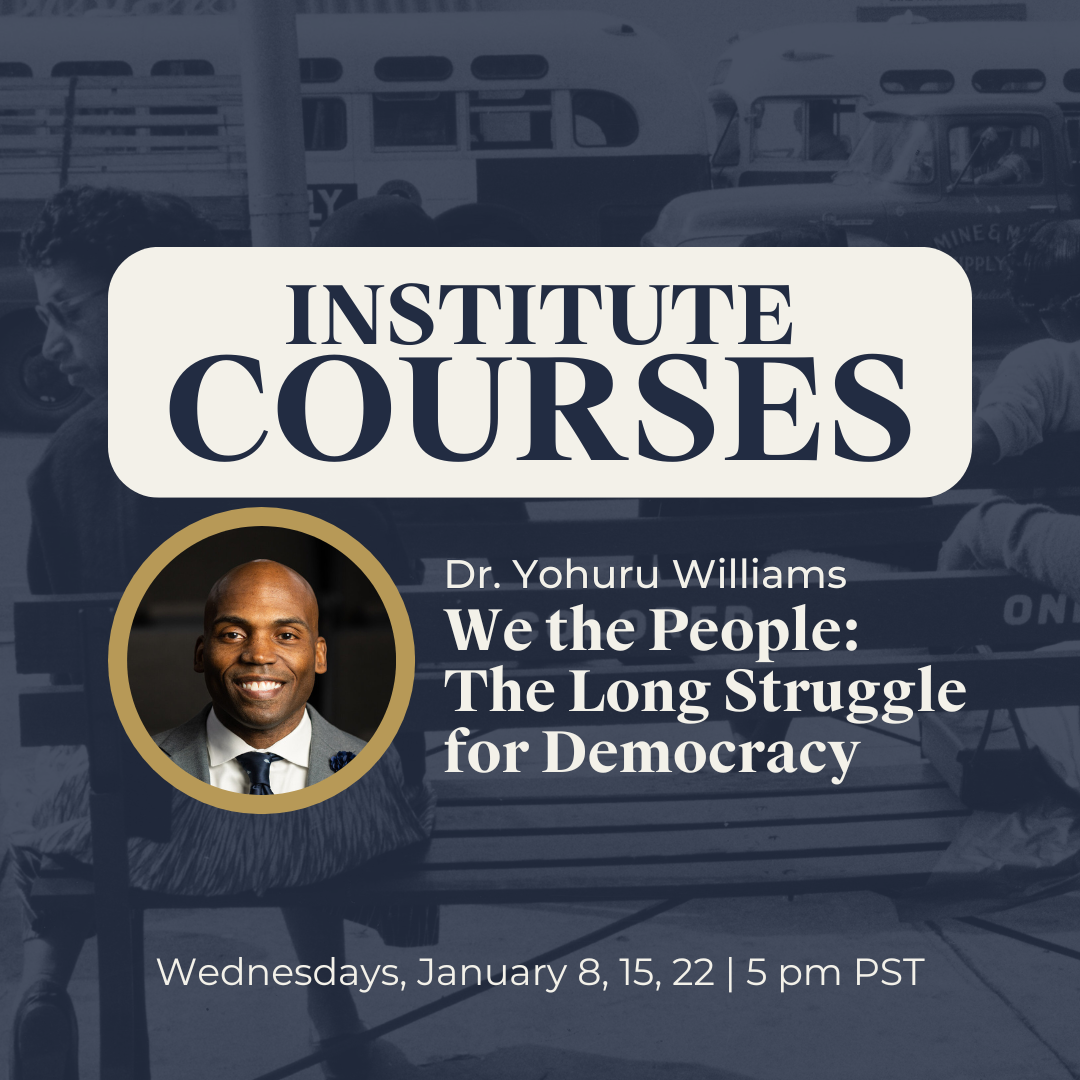
Institute Course - We the People: The Long Struggle for Democracy - Lecture 3
This course will delve into the complex tapestry of social, economic, and political ramifications resulting from pivotal Supreme Court decisions. From the notorious Plessy v. Ferguson (1896), which upheld racial segregation, to the transformative Brown v. Board of Education (1954), striking down state-sponsored segregation in public schools, participants will analyze how these decisions reverberated through American society.
Special emphasis will be placed on landmark cases such as Shelby County v. Holder (2013), which dismantled key provisions of the Voting Rights Act, exploring its profound impact on the political landscape, and voting rights. The course concludes with an examination of Students for Fair Admissions v. Harvard (2023), probing the contemporary intersection of race and higher education. Through critical analysis and discussions, students will gain a comprehensive understanding of the intricate connections between legal decisions and the social, economic, and political dynamics that have shaped African American constitutional history.
Speaker: Dr. Yohuru Williams
Course Dates: Jan. 8, 15, 22 at 5pm PST.
Lectures for this course will be recorded for everyone to watch on your own timing. Registrants will receive viewing instructions/reminders in advance of each lecture.

Institute Course - We the People: The Long Struggle for Democracy - Lecture 2
This course will delve into the complex tapestry of social, economic, and political ramifications resulting from pivotal Supreme Court decisions. From the notorious Plessy v. Ferguson (1896), which upheld racial segregation, to the transformative Brown v. Board of Education (1954), striking down state-sponsored segregation in public schools, participants will analyze how these decisions reverberated through American society.
Special emphasis will be placed on landmark cases such as Shelby County v. Holder (2013), which dismantled key provisions of the Voting Rights Act, exploring its profound impact on the political landscape, and voting rights. The course concludes with an examination of Students for Fair Admissions v. Harvard (2023), probing the contemporary intersection of race and higher education. Through critical analysis and discussions, students will gain a comprehensive understanding of the intricate connections between legal decisions and the social, economic, and political dynamics that have shaped African American constitutional history.
Speaker: Dr. Yohuru Williams
Course Dates: Jan. 8, 15, 22 at 5pm PST.
Lectures for this course will be recorded for everyone to watch on your own timing. Registrants will receive viewing instructions/reminders in advance of each lecture.

Institute Course - We the People: The Long Struggle for Democracy - Lecture 1
This course will delve into the complex tapestry of social, economic, and political ramifications resulting from pivotal Supreme Court decisions. From the notorious Plessy v. Ferguson (1896), which upheld racial segregation, to the transformative Brown v. Board of Education (1954), striking down state-sponsored segregation in public schools, participants will analyze how these decisions reverberated through American society.
Special emphasis will be placed on landmark cases such as Shelby County v. Holder (2013), which dismantled key provisions of the Voting Rights Act, exploring its profound impact on the political landscape, and voting rights. The course concludes with an examination of Students for Fair Admissions v. Harvard (2023), probing the contemporary intersection of race and higher education. Through critical analysis and discussions, students will gain a comprehensive understanding of the intricate connections between legal decisions and the social, economic, and political dynamics that have shaped African American constitutional history.
Speaker: Dr. Yohuru Williams
Course Dates: Jan. 8, 15, 22 at 5pm PST.
Lectures for this course will be recorded for everyone to watch on your own timing. Registrants will receive viewing instructions/reminders in advance of each lecture.

BEATING THE BACKLASH: How Democracy Might Actually Be Winning in America - Part 3
The journey in the United States toward a more perfect union of multi-racial democracy is marked by a consistent pattern: painstaking work achieves significant progress, and then there is massive backlash. That backlash often has been brutal and lengthy. The abolition of slavery was followed by lynching and racial terrorism, for example. It’s a pattern that we are now living in, with the MAGA Nation backlash to the presidency of Barack Obama, increasingly diversifying American landscape, and life-changing Internet and mobile technologies. Donald Trump won in 2016 and 2024, yes, and has wrought significant damage, as has the US Supreme Court. However, if we look at the larger arc of American history, we might actually conclude that democracy is winning right now in the country. As we think about 2024 and look forward, this Institute course explores the state of American democracy, and how we have, do, and will work to overcome. Registrants will receive viewing instructions/reminders in advance of each lecture.
Speaker: Professor David Domke
Course Dates: Nov. 19, 26 and Dec. 3 at 5pm PST.
Lectures for this course will be recorded for everyone to watch on your own timing. Registrants will receive viewing instructions/reminders in advance of each lecture.









